A Critical Analysis of US Foreign Policy in Latin America Context
VerifiedAdded on 2022/11/18
|6
|1521
|77
Essay
AI Summary
This essay provides a comprehensive analysis of US foreign policy towards Latin America, tracing its evolution from the 19th century to the present day. It examines the historical context, including the Monroe Doctrine and the No Transfer Principle, and explores the contrasting progressive and conservative approaches to the region. The essay highlights the influence of economic interests, particularly capitalism and globalization, and analyzes how factors such as free trade agreements and public attitudes shape US policy. The essay also discusses the impact of US foreign policy on Latin American countries, considering both economic and political dimensions. The essay concludes by emphasizing the importance of fostering positive relationships with Latin American nations for mutual benefit, and the need to avoid a hegemonic approach.
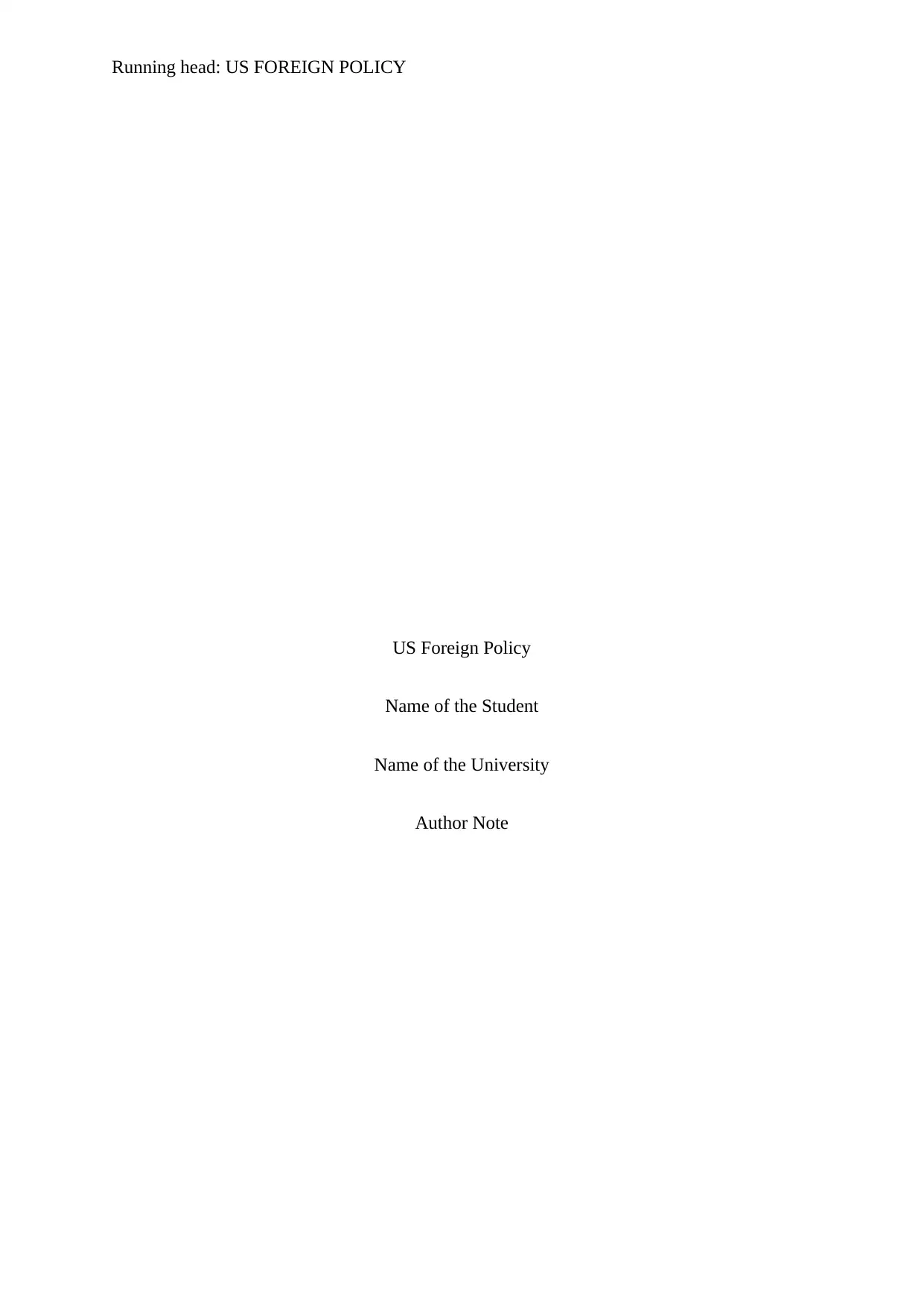
Running head: US FOREIGN POLICY
US Foreign Policy
Name of the Student
Name of the University
Author Note
US Foreign Policy
Name of the Student
Name of the University
Author Note
Paraphrase This Document
Need a fresh take? Get an instant paraphrase of this document with our AI Paraphraser
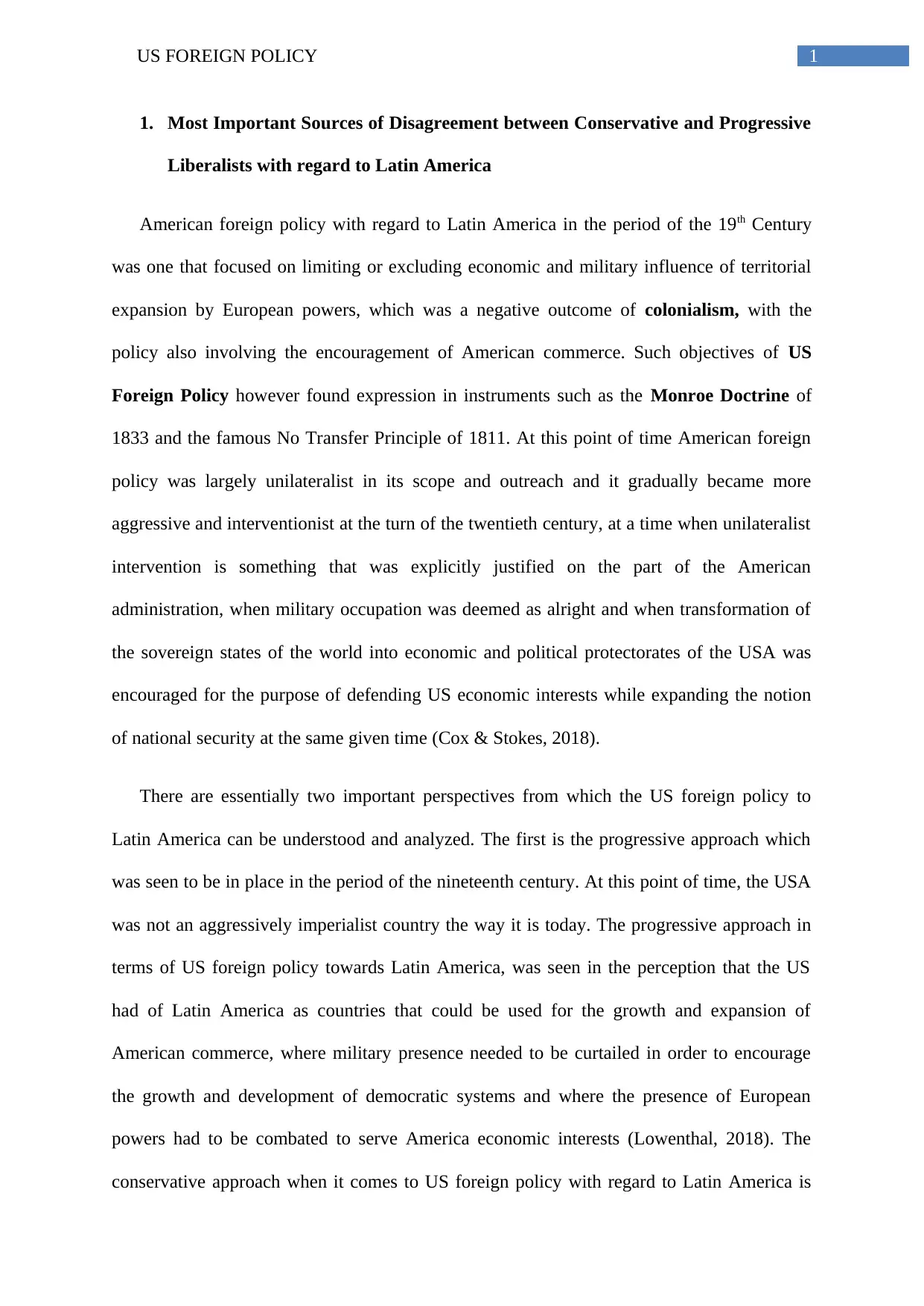
1US FOREIGN POLICY
1. Most Important Sources of Disagreement between Conservative and Progressive
Liberalists with regard to Latin America
American foreign policy with regard to Latin America in the period of the 19th Century
was one that focused on limiting or excluding economic and military influence of territorial
expansion by European powers, which was a negative outcome of colonialism, with the
policy also involving the encouragement of American commerce. Such objectives of US
Foreign Policy however found expression in instruments such as the Monroe Doctrine of
1833 and the famous No Transfer Principle of 1811. At this point of time American foreign
policy was largely unilateralist in its scope and outreach and it gradually became more
aggressive and interventionist at the turn of the twentieth century, at a time when unilateralist
intervention is something that was explicitly justified on the part of the American
administration, when military occupation was deemed as alright and when transformation of
the sovereign states of the world into economic and political protectorates of the USA was
encouraged for the purpose of defending US economic interests while expanding the notion
of national security at the same given time (Cox & Stokes, 2018).
There are essentially two important perspectives from which the US foreign policy to
Latin America can be understood and analyzed. The first is the progressive approach which
was seen to be in place in the period of the nineteenth century. At this point of time, the USA
was not an aggressively imperialist country the way it is today. The progressive approach in
terms of US foreign policy towards Latin America, was seen in the perception that the US
had of Latin America as countries that could be used for the growth and expansion of
American commerce, where military presence needed to be curtailed in order to encourage
the growth and development of democratic systems and where the presence of European
powers had to be combated to serve America economic interests (Lowenthal, 2018). The
conservative approach when it comes to US foreign policy with regard to Latin America is
1. Most Important Sources of Disagreement between Conservative and Progressive
Liberalists with regard to Latin America
American foreign policy with regard to Latin America in the period of the 19th Century
was one that focused on limiting or excluding economic and military influence of territorial
expansion by European powers, which was a negative outcome of colonialism, with the
policy also involving the encouragement of American commerce. Such objectives of US
Foreign Policy however found expression in instruments such as the Monroe Doctrine of
1833 and the famous No Transfer Principle of 1811. At this point of time American foreign
policy was largely unilateralist in its scope and outreach and it gradually became more
aggressive and interventionist at the turn of the twentieth century, at a time when unilateralist
intervention is something that was explicitly justified on the part of the American
administration, when military occupation was deemed as alright and when transformation of
the sovereign states of the world into economic and political protectorates of the USA was
encouraged for the purpose of defending US economic interests while expanding the notion
of national security at the same given time (Cox & Stokes, 2018).
There are essentially two important perspectives from which the US foreign policy to
Latin America can be understood and analyzed. The first is the progressive approach which
was seen to be in place in the period of the nineteenth century. At this point of time, the USA
was not an aggressively imperialist country the way it is today. The progressive approach in
terms of US foreign policy towards Latin America, was seen in the perception that the US
had of Latin America as countries that could be used for the growth and expansion of
American commerce, where military presence needed to be curtailed in order to encourage
the growth and development of democratic systems and where the presence of European
powers had to be combated to serve America economic interests (Lowenthal, 2018). The
conservative approach when it comes to US foreign policy with regard to Latin America is
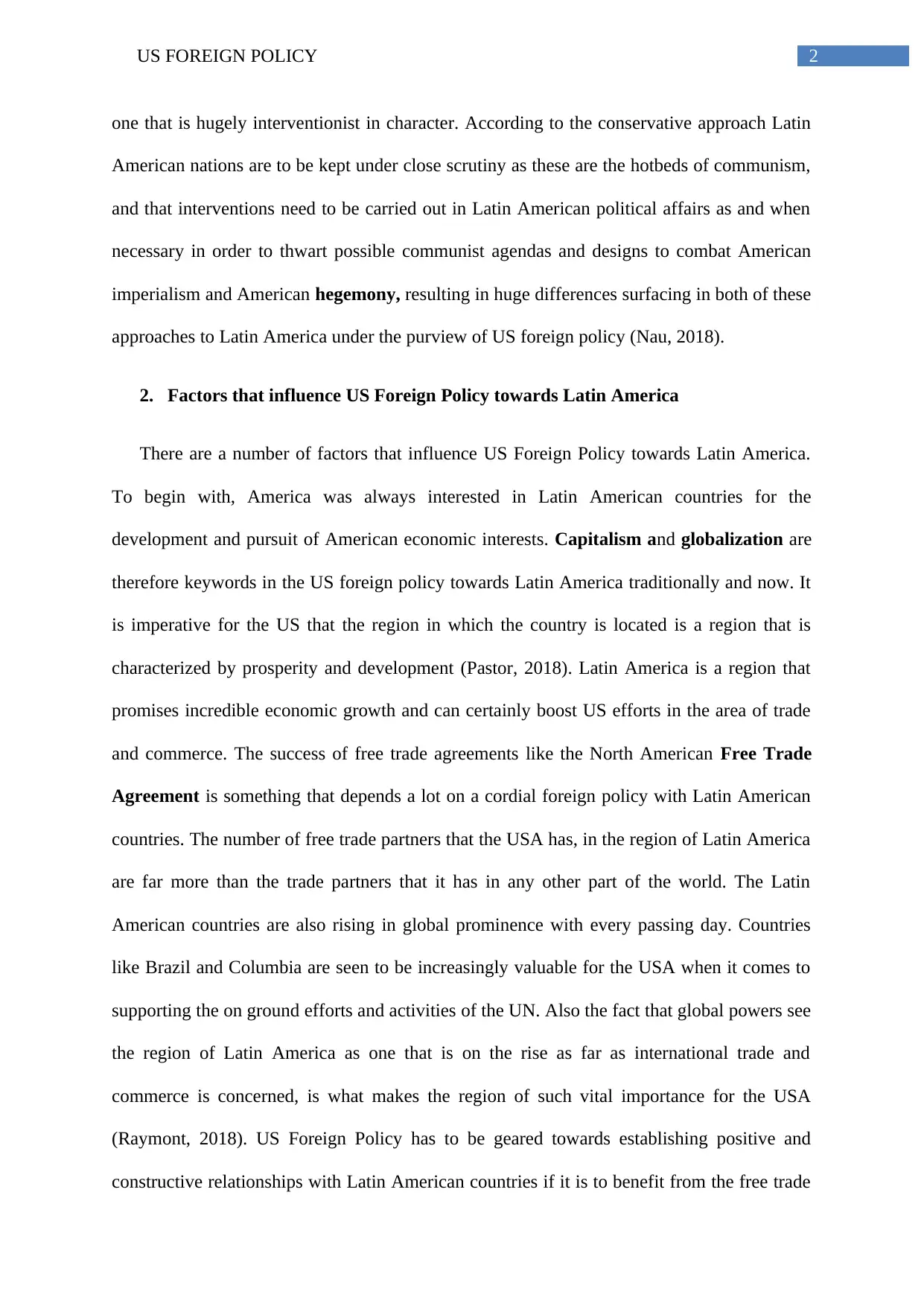
2US FOREIGN POLICY
one that is hugely interventionist in character. According to the conservative approach Latin
American nations are to be kept under close scrutiny as these are the hotbeds of communism,
and that interventions need to be carried out in Latin American political affairs as and when
necessary in order to thwart possible communist agendas and designs to combat American
imperialism and American hegemony, resulting in huge differences surfacing in both of these
approaches to Latin America under the purview of US foreign policy (Nau, 2018).
2. Factors that influence US Foreign Policy towards Latin America
There are a number of factors that influence US Foreign Policy towards Latin America.
To begin with, America was always interested in Latin American countries for the
development and pursuit of American economic interests. Capitalism and globalization are
therefore keywords in the US foreign policy towards Latin America traditionally and now. It
is imperative for the US that the region in which the country is located is a region that is
characterized by prosperity and development (Pastor, 2018). Latin America is a region that
promises incredible economic growth and can certainly boost US efforts in the area of trade
and commerce. The success of free trade agreements like the North American Free Trade
Agreement is something that depends a lot on a cordial foreign policy with Latin American
countries. The number of free trade partners that the USA has, in the region of Latin America
are far more than the trade partners that it has in any other part of the world. The Latin
American countries are also rising in global prominence with every passing day. Countries
like Brazil and Columbia are seen to be increasingly valuable for the USA when it comes to
supporting the on ground efforts and activities of the UN. Also the fact that global powers see
the region of Latin America as one that is on the rise as far as international trade and
commerce is concerned, is what makes the region of such vital importance for the USA
(Raymont, 2018). US Foreign Policy has to be geared towards establishing positive and
constructive relationships with Latin American countries if it is to benefit from the free trade
one that is hugely interventionist in character. According to the conservative approach Latin
American nations are to be kept under close scrutiny as these are the hotbeds of communism,
and that interventions need to be carried out in Latin American political affairs as and when
necessary in order to thwart possible communist agendas and designs to combat American
imperialism and American hegemony, resulting in huge differences surfacing in both of these
approaches to Latin America under the purview of US foreign policy (Nau, 2018).
2. Factors that influence US Foreign Policy towards Latin America
There are a number of factors that influence US Foreign Policy towards Latin America.
To begin with, America was always interested in Latin American countries for the
development and pursuit of American economic interests. Capitalism and globalization are
therefore keywords in the US foreign policy towards Latin America traditionally and now. It
is imperative for the US that the region in which the country is located is a region that is
characterized by prosperity and development (Pastor, 2018). Latin America is a region that
promises incredible economic growth and can certainly boost US efforts in the area of trade
and commerce. The success of free trade agreements like the North American Free Trade
Agreement is something that depends a lot on a cordial foreign policy with Latin American
countries. The number of free trade partners that the USA has, in the region of Latin America
are far more than the trade partners that it has in any other part of the world. The Latin
American countries are also rising in global prominence with every passing day. Countries
like Brazil and Columbia are seen to be increasingly valuable for the USA when it comes to
supporting the on ground efforts and activities of the UN. Also the fact that global powers see
the region of Latin America as one that is on the rise as far as international trade and
commerce is concerned, is what makes the region of such vital importance for the USA
(Raymont, 2018). US Foreign Policy has to be geared towards establishing positive and
constructive relationships with Latin American countries if it is to benefit from the free trade
⊘ This is a preview!⊘
Do you want full access?
Subscribe today to unlock all pages.

Trusted by 1+ million students worldwide
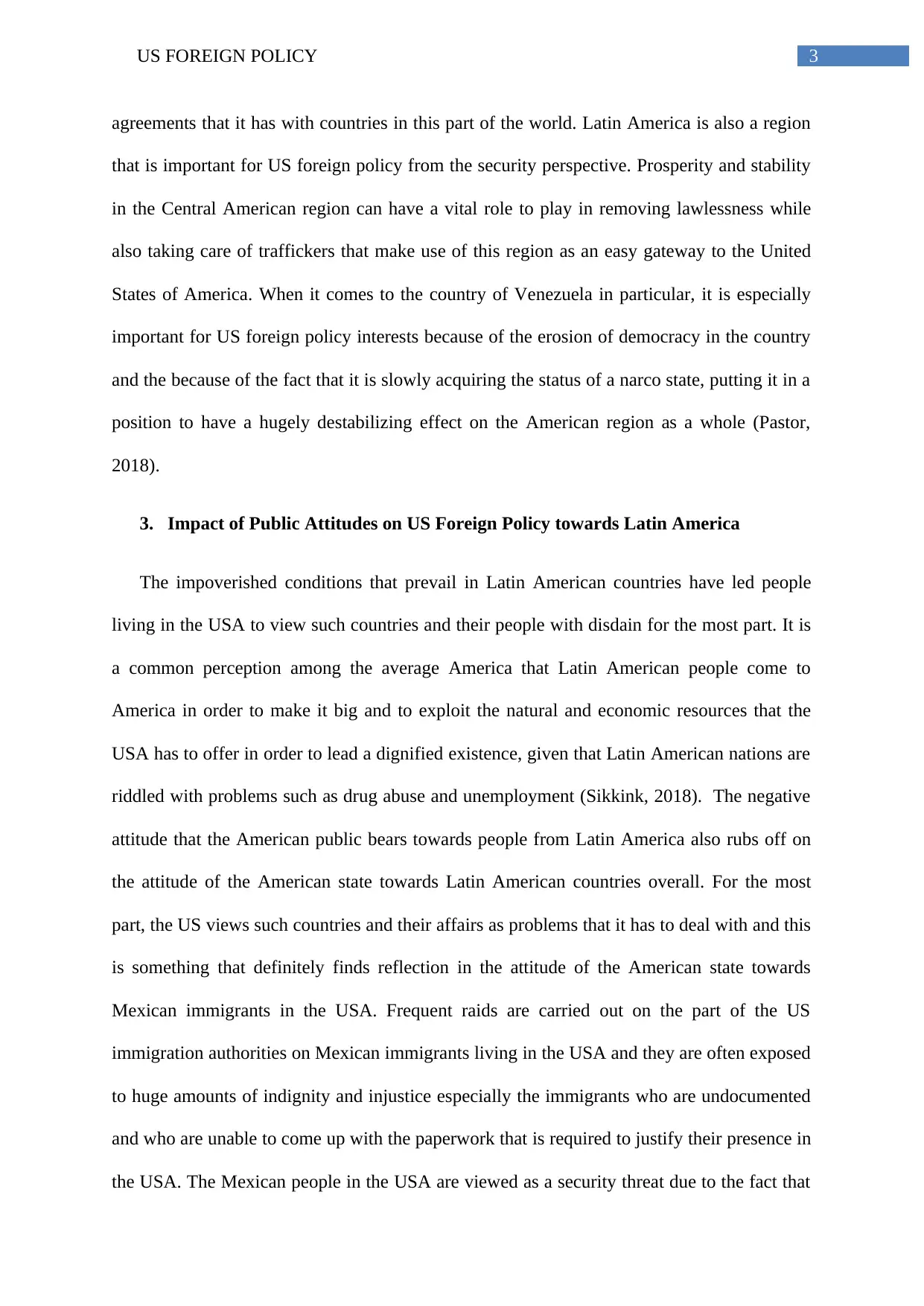
3US FOREIGN POLICY
agreements that it has with countries in this part of the world. Latin America is also a region
that is important for US foreign policy from the security perspective. Prosperity and stability
in the Central American region can have a vital role to play in removing lawlessness while
also taking care of traffickers that make use of this region as an easy gateway to the United
States of America. When it comes to the country of Venezuela in particular, it is especially
important for US foreign policy interests because of the erosion of democracy in the country
and the because of the fact that it is slowly acquiring the status of a narco state, putting it in a
position to have a hugely destabilizing effect on the American region as a whole (Pastor,
2018).
3. Impact of Public Attitudes on US Foreign Policy towards Latin America
The impoverished conditions that prevail in Latin American countries have led people
living in the USA to view such countries and their people with disdain for the most part. It is
a common perception among the average America that Latin American people come to
America in order to make it big and to exploit the natural and economic resources that the
USA has to offer in order to lead a dignified existence, given that Latin American nations are
riddled with problems such as drug abuse and unemployment (Sikkink, 2018). The negative
attitude that the American public bears towards people from Latin America also rubs off on
the attitude of the American state towards Latin American countries overall. For the most
part, the US views such countries and their affairs as problems that it has to deal with and this
is something that definitely finds reflection in the attitude of the American state towards
Mexican immigrants in the USA. Frequent raids are carried out on the part of the US
immigration authorities on Mexican immigrants living in the USA and they are often exposed
to huge amounts of indignity and injustice especially the immigrants who are undocumented
and who are unable to come up with the paperwork that is required to justify their presence in
the USA. The Mexican people in the USA are viewed as a security threat due to the fact that
agreements that it has with countries in this part of the world. Latin America is also a region
that is important for US foreign policy from the security perspective. Prosperity and stability
in the Central American region can have a vital role to play in removing lawlessness while
also taking care of traffickers that make use of this region as an easy gateway to the United
States of America. When it comes to the country of Venezuela in particular, it is especially
important for US foreign policy interests because of the erosion of democracy in the country
and the because of the fact that it is slowly acquiring the status of a narco state, putting it in a
position to have a hugely destabilizing effect on the American region as a whole (Pastor,
2018).
3. Impact of Public Attitudes on US Foreign Policy towards Latin America
The impoverished conditions that prevail in Latin American countries have led people
living in the USA to view such countries and their people with disdain for the most part. It is
a common perception among the average America that Latin American people come to
America in order to make it big and to exploit the natural and economic resources that the
USA has to offer in order to lead a dignified existence, given that Latin American nations are
riddled with problems such as drug abuse and unemployment (Sikkink, 2018). The negative
attitude that the American public bears towards people from Latin America also rubs off on
the attitude of the American state towards Latin American countries overall. For the most
part, the US views such countries and their affairs as problems that it has to deal with and this
is something that definitely finds reflection in the attitude of the American state towards
Mexican immigrants in the USA. Frequent raids are carried out on the part of the US
immigration authorities on Mexican immigrants living in the USA and they are often exposed
to huge amounts of indignity and injustice especially the immigrants who are undocumented
and who are unable to come up with the paperwork that is required to justify their presence in
the USA. The Mexican people in the USA are viewed as a security threat due to the fact that
Paraphrase This Document
Need a fresh take? Get an instant paraphrase of this document with our AI Paraphraser
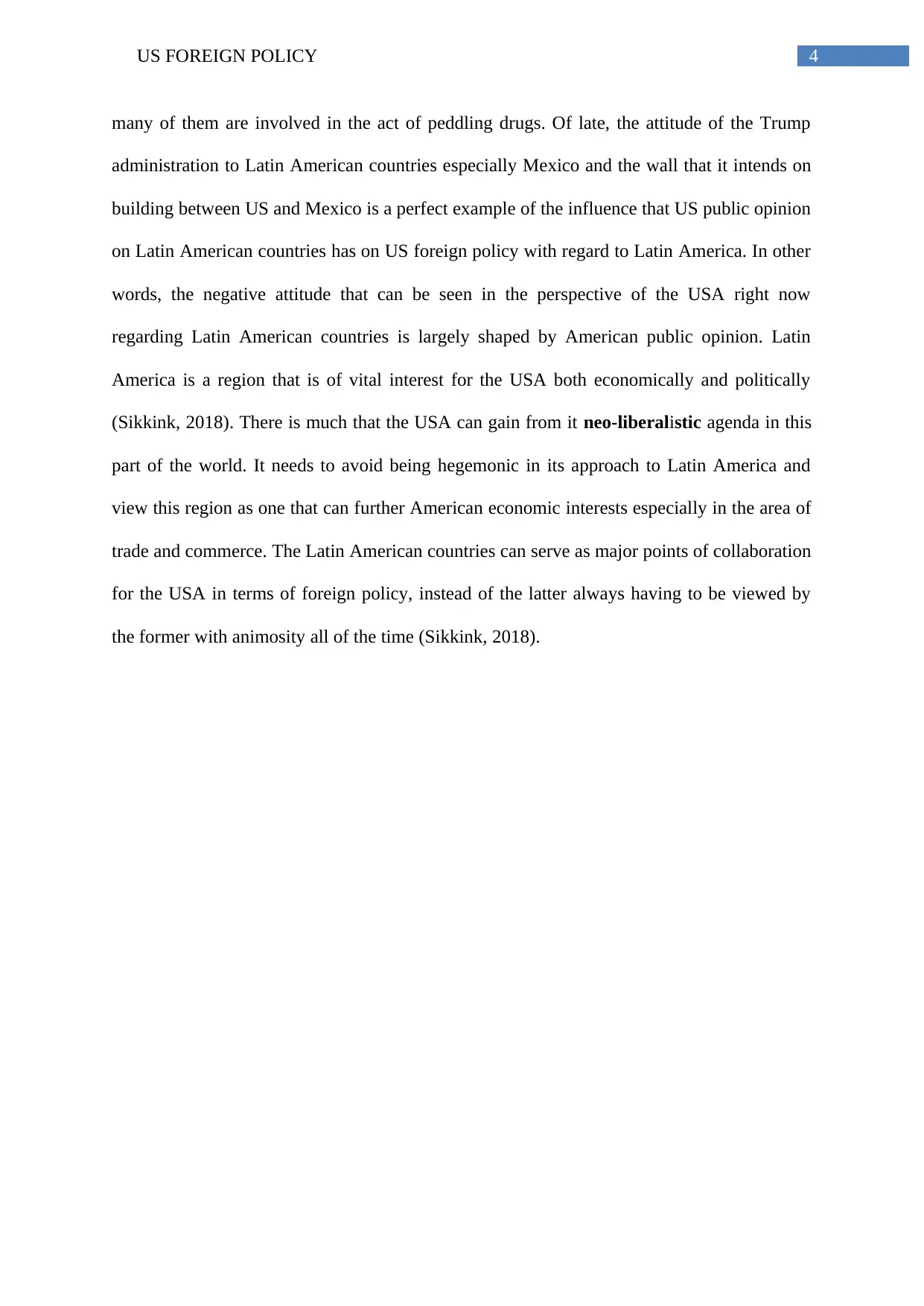
4US FOREIGN POLICY
many of them are involved in the act of peddling drugs. Of late, the attitude of the Trump
administration to Latin American countries especially Mexico and the wall that it intends on
building between US and Mexico is a perfect example of the influence that US public opinion
on Latin American countries has on US foreign policy with regard to Latin America. In other
words, the negative attitude that can be seen in the perspective of the USA right now
regarding Latin American countries is largely shaped by American public opinion. Latin
America is a region that is of vital interest for the USA both economically and politically
(Sikkink, 2018). There is much that the USA can gain from it neo-liberalistic agenda in this
part of the world. It needs to avoid being hegemonic in its approach to Latin America and
view this region as one that can further American economic interests especially in the area of
trade and commerce. The Latin American countries can serve as major points of collaboration
for the USA in terms of foreign policy, instead of the latter always having to be viewed by
the former with animosity all of the time (Sikkink, 2018).
many of them are involved in the act of peddling drugs. Of late, the attitude of the Trump
administration to Latin American countries especially Mexico and the wall that it intends on
building between US and Mexico is a perfect example of the influence that US public opinion
on Latin American countries has on US foreign policy with regard to Latin America. In other
words, the negative attitude that can be seen in the perspective of the USA right now
regarding Latin American countries is largely shaped by American public opinion. Latin
America is a region that is of vital interest for the USA both economically and politically
(Sikkink, 2018). There is much that the USA can gain from it neo-liberalistic agenda in this
part of the world. It needs to avoid being hegemonic in its approach to Latin America and
view this region as one that can further American economic interests especially in the area of
trade and commerce. The Latin American countries can serve as major points of collaboration
for the USA in terms of foreign policy, instead of the latter always having to be viewed by
the former with animosity all of the time (Sikkink, 2018).
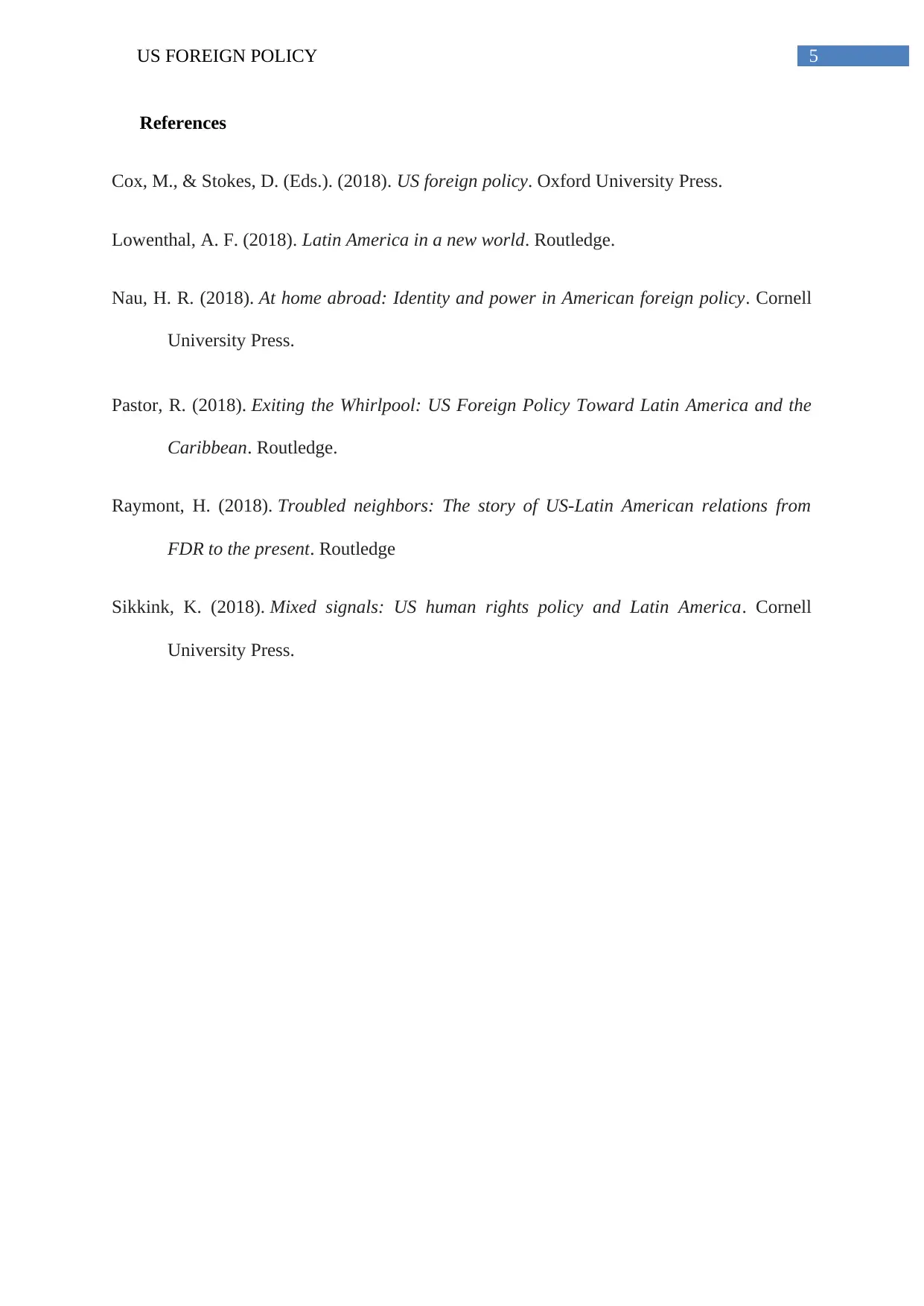
5US FOREIGN POLICY
References
Cox, M., & Stokes, D. (Eds.). (2018). US foreign policy. Oxford University Press.
Lowenthal, A. F. (2018). Latin America in a new world. Routledge.
Nau, H. R. (2018). At home abroad: Identity and power in American foreign policy. Cornell
University Press.
Pastor, R. (2018). Exiting the Whirlpool: US Foreign Policy Toward Latin America and the
Caribbean. Routledge.
Raymont, H. (2018). Troubled neighbors: The story of US-Latin American relations from
FDR to the present. Routledge
Sikkink, K. (2018). Mixed signals: US human rights policy and Latin America. Cornell
University Press.
References
Cox, M., & Stokes, D. (Eds.). (2018). US foreign policy. Oxford University Press.
Lowenthal, A. F. (2018). Latin America in a new world. Routledge.
Nau, H. R. (2018). At home abroad: Identity and power in American foreign policy. Cornell
University Press.
Pastor, R. (2018). Exiting the Whirlpool: US Foreign Policy Toward Latin America and the
Caribbean. Routledge.
Raymont, H. (2018). Troubled neighbors: The story of US-Latin American relations from
FDR to the present. Routledge
Sikkink, K. (2018). Mixed signals: US human rights policy and Latin America. Cornell
University Press.
⊘ This is a preview!⊘
Do you want full access?
Subscribe today to unlock all pages.

Trusted by 1+ million students worldwide
1 out of 6
Related Documents
Your All-in-One AI-Powered Toolkit for Academic Success.
+13062052269
info@desklib.com
Available 24*7 on WhatsApp / Email
![[object Object]](/_next/static/media/star-bottom.7253800d.svg)
Unlock your academic potential
Copyright © 2020–2026 A2Z Services. All Rights Reserved. Developed and managed by ZUCOL.





